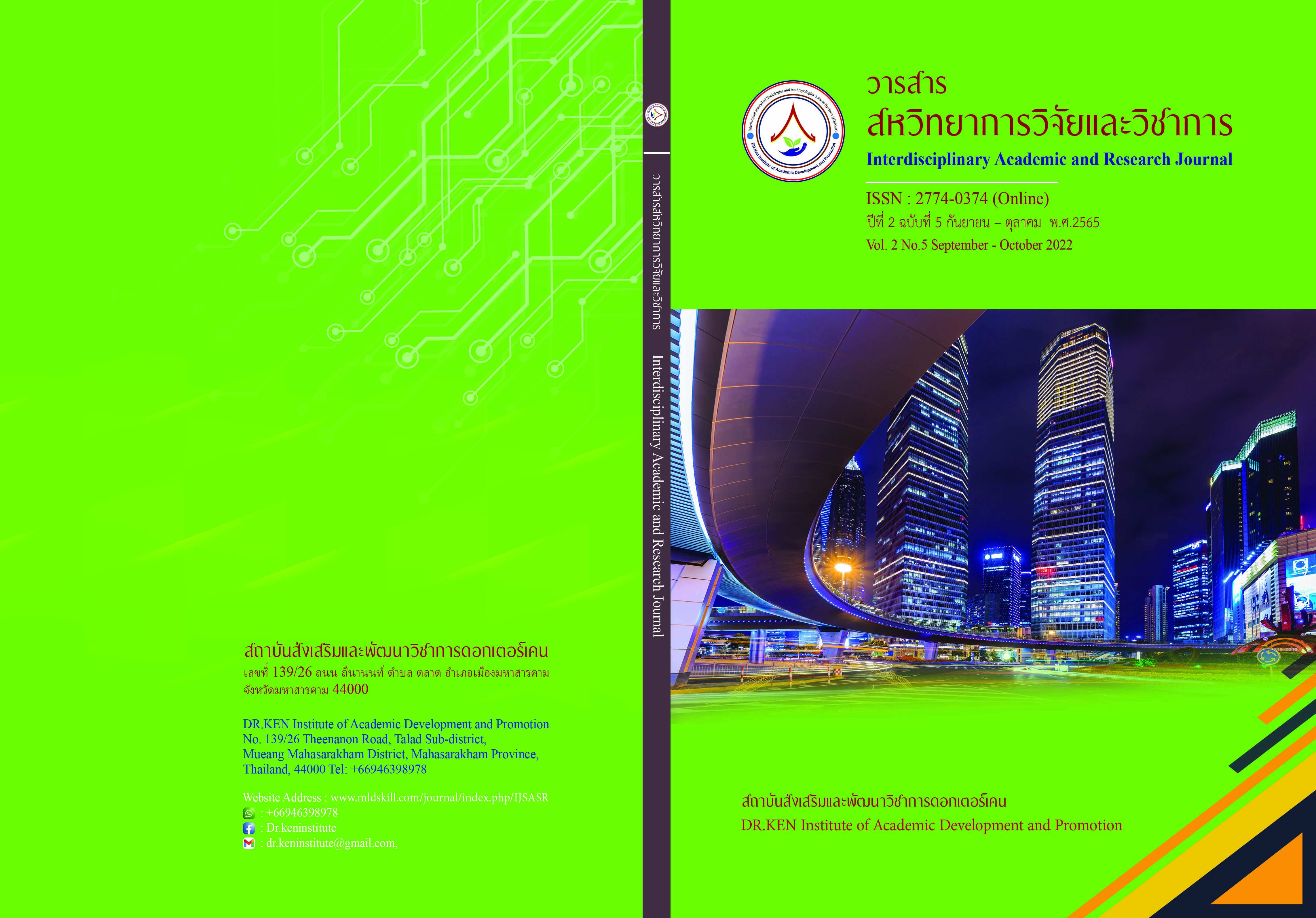Motivational Factors Affecting the Success in Implementing Good Governance Administration for the Personnel of Sakon Nakhon Provincial Administrative Organization
DOI:
https://doi.org/10.14456/iarj.2022.91Keywords:
Motivational Factors; , Good Governance Administration; , Provincial Administrative OrganizationAbstract
Good governance is administered by a civil society that promotes multilateral linkages. Coordinate mutual support between government organizations, the private sector, and the public. To allocate resources to meet the needs and solve problems of the people with the participation of citizens and the responsibilities of government agencies. The private sector is effective, effective, transparent, equitable, and fair. The purposes of this research were: 1) To study the level of motivational factors and the level of success in implementing good governance administration of the personnel, 2) To investigate the influences of motivational factors on the success in implementing good governance administration of the personnel, 3) To explore and gain guidelines on developing the motivational factors that affected the success in implementing good governance administration of personnel. Obtained through stratified random sampling technique, the sample group of this study consisted of 225 personnel of Sakon Nakhon Provincial Administrative Organization. The instruments used for data collection were the questionnaire and interview form to gain the development guidelines. The statistics employed to analyze the data were composed of frequency, percentage, mean, standard deviation, Multiple Regression Analysis, and content analysis. The findings were as follows: (1). The motivational factors of the personnel were at a high level, and the success in implementing good governance administration was at a high level. (2). These motivational factors influenced the success in implementing good governance administration of the personnel: success in performing one’s job (β =.482), responsibility (β =.254), recognition/acceptance (β =.222), work characteristics (β =.190), and occupational progress (β =.176). Altogether, these motivational factors could be used to predict the success in implementing good governance administration of the personnel for 49.90%. In the same vein, these maintenance/hygiene factors also influenced the success in implementing good governance administration of the personnel: policy and administration (β =.297), interpersonal relation (β =.292), and commanding and governing (β =.165). These maintenance/hygiene factors could be used jointly to predict the success of implementing good governance administration for 53.00%. (3). Several guidelines were given for developing motivational factors and the success in implementing good governance administration; the administrators should allow their personnel as well as the public to share their opinions on and participate in setting up the organizational administration guidelines and policies.
References
กมลพร กัลยาณมิตร. (2559). แรงจูงใจ 2 ปัจจัย พลังสู่ความสำเร็จ. วารสารวไลยอลงกรณ์ปริทัศน์ (มนุษยศาสตร์และสังคมศาสตร์), 6(3), 175-183.
กรมส่งเสริมการปกครองท้องถิ่น กระทรวงมหาดไทย. (2555). คู่มือการจัดทำหลักเกณฑการบริหารกิจการบ้านเมืองที่ดีขององค์กรปกครองส่วนท้องถิ่น. กรุงเทพฯ: โรงพิมพ์ชุมชนสหกรณ์การเกษตรแห่งประเทศไทย.
กฤษณา ช่างสากล. (2558). ปัจจัยที่มีอิทธิพลต่อการบริหารกิจการบ้านเมืองที่ดีขององค์กรปกครองส่วนท้องถิ่นในเขตอำเภอนาดูน จังหวัดมหาสารคาม. วิทยานิพนธ์รัฐประศาสนศาสตรมหาบัณฑิต: มหาวิทยาลัยราชภัฏมหาสารคาม.
แก้วกาญจน์ กิมานุวัฒน์. (2564). ปัจจัยการบริหารที่ส่งผลต่อความสำเร็จในการบริหารตามหลักธรรมาภิบาลในโรงเรียน สังกัดสำนักงานเขตพื้นที่การศึกษาประถมศึกษาอำนาจเจริญ. วิทยานิพนธ์ครุศาสตรมหาบัณฑิต : มหาวิทยาลัยราชภัฏสกลนคร.
ถนัดชัย ธนะสูตร. (2553). ความสัมพันธ์ระหว่างแรงจูงใจกับการปฏิบัติงานตามหลักธรรมาภิบาลของเจ้าหน้าที่สถานีอนามัยในจังหวัดเลย. วิทยานิพนธ์บริหารธุรกิจมหาบัณฑิต : มหาวิทยาลัยสุโขทัยธรรมาธิราช.
นวรัตน์ อายุยืน. (2561). แรงจูงใจที่ส่งผลต่อการปฏิบัติงานตามหลักธรรมาภิบาลของครูสังกัดสำนักงานเขตพื้นที่การศึกษาประถมศึกษาระยอง เขต 1. วิทยานิพนธ์ครุศาสตรมหาบัณฑิจ: มหาวิทยาลัยราชภัฏรำไพพรรณี.
ปิยวรรณ พลศรี. (2556). ปัจจัยที่มีผลต่อความสำเร็จในการบริหารกิจการบ้านเมืองที่ดีขององค์การบริหารส่วนตำบลในเขตอำเภอกันทรวิชัย จังหวัดมหาสารคาม. วิทยานิพนธ์รัฐประศาสนศาสตรมหาบัณฑิต: มหาวิทยาลัยราชภัฏมหาสารคาม.
พรเพชร บุตรดี. (2563). อิทธิพลของแรงจูงใจในการทำงานที่มีต่อพฤติกรรมการเป็นสมาชิกที่ดีขององค์การของบุคลากรองค์กรปกครองส่วนท้องถิ่นในเขตอำเภอท่าอุเทน จังหวัดนครพนม. วิทยานิพนธ์รัฐประศาสนศาสตรมหาบัณฑิต: มหาวิทยาลัยราชภัฏสกลนคร.
เยาวรักษ์ ฉัตรวิไล. (2560). ประสิทธิภาพการบริหารงานพัสดุขององค์การบริหารส่วนจังหวัดสกลนคร. วิทยานิพนธ์รัฐประศาสนศาสตรมหาบัณฑิต: มหาวิทยาลัยราชภัฏสกลนคร.
สมเกียรติ เกียรติเจริญ. (2552). เทคนิคการทำวิจัย วิทยานิพนธ์ และการค้นคว้าอิสระ. มหาสารคาม: สารคามการพิมพ์.
สำนักงานคณะกรรมการพัฒนาระบบราชการ. (2555). หลักธรรมาภิบาลของการบริหารกิจการบ้านเมืองที่ดี (พิมพ์ครั้งที่ 1). กรุงเทพฯ: สำนักงานคณะกรรมการพัฒนาระบบราชการ (สำนักงาน ก.พ.ร.).
อาทิตย์ แสนมะฮุง. (2558). การบริหารงานตามหลักธรรมาภิบาลขององค์การบริหารส่วนจังหวัดสกลนคร. วิทยานิพนธ์รัฐประศาสนศาสตรมหาบัณฑิต: มหาวิทยาลัยราชภัฏสกลนคร.
Herzberg, F. et al. (1959). The Motivation to work. New York: John Wiley and Sons.
Yamane, Taro. (1973). Statistics: An Introductory Analysis. Third edition. New York: Harper and Row Publication.
Downloads
Published
How to Cite
Issue
Section
License
Copyright (c) 2022 จิรันดา บุญบรรจง, สามารถ อัยกร, ชาติชัย อุดมกิจมงคล

This work is licensed under a Creative Commons Attribution-NonCommercial-NoDerivatives 4.0 International License.
Copyright on any article in the Interdisciplinary Academic and Research Journal is retained by the author(s) under the under the Creative Commons Attribution-NonCommercial-NoDerivatives 4.0 International License. Permission to use text, content, images, etc. of publication. Any user to read, download, copy, distribute, print, search, or link to the full texts of articles, crawl them for indexing, pass them as data to software, or use them for any other lawful purpose. But do not use it for commercial use or with the intent to benefit any business.
















.png)


